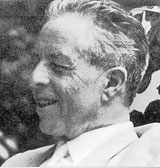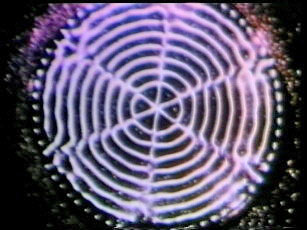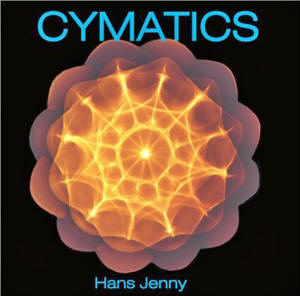|
by Frank Perry 2002 from FranckPerry Website
The term Cymatics (pronounced
sigh-matt-ix) was coined by Dr. Hans Jenny (1904 -1972). It is
derived from the Greek word Kyma or ta kymatika meaning: matters
pertaining to waves. By the term waves, Jenny was particularly
wishing to point
This work revolves around the ability to demonstrate acoustic phenomenon, which work was begun in the late 18th century by Ernst Chladni (1756-1827) and then, in the late 19th century, developed further by Margaret Watts-Hughes (using the human voice and several diaphragms) and then taken a stage further by Jenny in the middle of the 20th century. The famous Chladni Figures had previously visibly demonstrated the organizing power of sound and vibration. The method was to take a metal plate and to suspend it as freely as possible and then to excite it into activity via the use of a violin bow. Most typically, this was to clamp it at its centre leaving the rest of the plate fairly free to vibrate.
Placing some sand upon the surface and then bowing the plate aroused the sand particles into activity and into very beautifully organized regular geometric shapes. Bowing the plate at different points excited other harmonics, which further developed the resulting patterns into different, yet still ordered and repeatable, geometric or mandala-like patterns. Each single harmonic of the plate when sounded created the same pattern, which increased in complexity as one progressed along the harmonic series. (The Harmonic Series is the basis of Overtone Singing - for more read my article on this OVERTONE SINGING)
A visible sound
photograph by Dr. Hans Jenny The harmonic series, or overtones, is likewise a law of nature that follows a strictly mathematical progression for the human voice, strings, and brass instruments. This series is predictable and ordered and finds its reflection within the Cymatics phenomenon. For instance, the first overtone is known as the Octave, whilst the next overtone is a perfect Fifth and the following overtone is a Fourth. Each overtone produces an interval that gets progressively smaller as the process moves along until they are so close together that the human ear cannot detect the difference. Each succeeding Octave is also divided up in an arithmetic series.
That is to say that the first Octave produces One interval (known as the Octave) and in the next Octave we find Two intervals, whilst in the next higher Octave we find Four intervals and the next Octave Eight intervals and so on. The interval of an Octave is when the note upon which the whole series begins is reached again only vibrating at twice, four times, eight times - and so on - its original speed. Therefore, if we begin on the note C the next Octave is also called C but it is vibrating twice as fast as the original C. If the first tone is vibrating at 250 cycles per second (cps) then the Octave vibrates at 500 cps, the next Octave at 1,000 cps (4 times the original speed) and so on.
The introduction of this Law into Western music is attributed to the great Sage of Samos - Pythagoras (around 600 BC) - and an entire cosmology was further developed around these musical principles, and published in certain of his writings, by the 17th century English Rosicrucian apologist Robert Fludd (1574-1637).
One of the Cymatic
images photographed by Dr. Hans Jenny
Dr. Jenny took the idea of the Chladni
plate but went on to excite it using precisely measured vibrations
(cps - Hertz) and amplifications (volume) via a piezoelectric effect
using a crystal oscillator and then to cover the plate with various
substances and finally to document his results in both photographs
and films. He researched this phenomena for 14 years. The results
are truly awe inspiring, breathtaking, most inspiring and
enlightening. The films in particular are most stimulating. By
filming the experiments, we are able to see instances of when forms
arise out of chaotic substance and then return back again into what
we might term the Virgin Space of Repotentialisation only to come
forth again forming the same pattern (providing the tone remains the
same). Here we see cyclic phenomenon taking place, where all is in
constant movement. Even the regularly formed geometric patterns are
shown to be comprised of numerous particles constantly moving within
those patterns - like an army of ants walking backwards and forwards
along a straight line (demonstrating the Particle / Wave
phenomenon).
I was first introduced to the work of Dr. Hans Jenny by David Toop when he and I worked together in the mid 70s and immediately bought both hardback volumes of these large illustrated books. They each cost £25, even in 1975, primarily because they were printed in Switzerland, which printed fantastic photographs. These are very hard to come by now but they have recently been combined into one large hardback volume and published in the USA but available over here in the UK for only £35 and, whereas the original volumes placed the German and English alongside each other, this new volume is only in English.
The cover
illustration of the new release of this important work with sound Hans Jenny (1904-1972) was indeed a Renaissance man in every sense of the word. A medical doctor, fine artist, pianist, philosopher, historian, physical scientist and researcher, his insatiable curiosity embraced all fields of human endeavour, and his substantial talent and acumen helped him master many of them.
|

 towards
periodicity or cycles. Dr. Jenny was an Anthroposophist (a follower
of the teachings of the Austrian philosopher, occultist, mystic and
clairvoyant Rudolph Steiner 1864-1925).
towards
periodicity or cycles. Dr. Jenny was an Anthroposophist (a follower
of the teachings of the Austrian philosopher, occultist, mystic and
clairvoyant Rudolph Steiner 1864-1925). 

